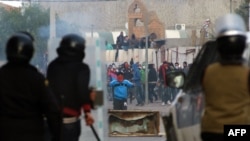Protests have been spreading across parts of Tunisia during the past week, after a young unemployed man committed suicide. The wave of popular unrest appears to coincide with the fifth anniversary of the ouster of President Zine al Abidine Ben Ali.
Clashes among small crowds of young protesters and police continue to rock the eastern Tunisian town of Kassrine, along with half a dozen other towns and cities. Protests broke out Saturday after 27-year-old Rida Yehyawi electrocuted himself after failing to land a public sector job.
Unemployed workers and young people have demonstrated in front of several government buildings in the capital, Tunis, as well, to try to draw attention to their plight.
Tunisian state TV quoted an Interior Ministry spokesman as saying "agitators were infiltrating popular protests to provoke violence.” He urged protesters to “beware of terrorists or troublemakers in their midst.”
Several dozen protesters were hurt during clashes Tuesday and Wednesday. Police in several regions are also protesting, after the death of an officer during a clash Wednesday.
One protester said he and those around him are not seeking violence:
He says the demonstrators have legitimate demands and are conducting a peaceful movement, refusing violence and destruction of property.
University of Paris political science professor Khattar Abou Diab says social justice is a major problem in Tunisia.
"No matter who runs the country, Tunisia has suffered from the unequal distribution of wealth. The capital and wealthy areas along the coast are better treated than interior areas of the country. People have won more freedom since the 2011 revolution, but want more concrete items like food and jobs," said Diab.
Dubai-based Middle East analyst Theodore Karasik argues that Tunisia "appears to be going backwards........despite the country's successes with the Arab Spring." He contends that "with Islamic State attacks, the presence of al Qaida [AQIM], and a push from the Muslim Brotherhood".........."the nightmare scenario of violence engulfing the Maghreb is becoming a reality."
Tunisian President Baji Qaid al Sabsi told state TV he understood the plight of the young and unemployed and the government is planning to hire several thousand people in public service jobs.










